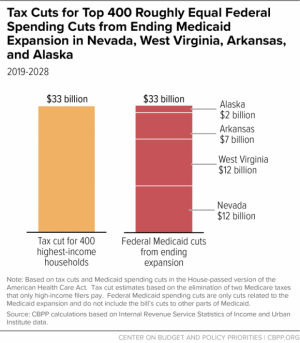
- The bill leaves millions without health coverage. The non-partisan Congressional Budget Office (CBO) analysis of the Senate bill shows that 22 million more people would lose coverage over the next decade. This is a slight improvement from the 23 million people expected to lose coverage under the version of the bill passed by the House.
- The bill makes deep cuts to the Medicaid program and strips coverage for kids, seniors, and people with disabilities. Today, states and the federal government share the costs of health care for enrollees. The Senate bill will cap federal funding and force states to make up the difference. These deep cuts to the Medicaid program, which get larger every year, will put the health of the most vulnerable Arkansans at risk. A recent estimate from the Urban Institute shows that the number of Medicaid enrollees in Arkansas would decrease by nearly 43 percent for enrollees under 65 years old.*
- The bill will strain the state budget. The proposed cuts to the Medicaid program will only shift costs to the state. Recent estimates show that in Arkansas we would lose $3 billion dollars over the next decade.* This cost shift would create a large hole in the state budget, since Medicaid dollars account for over 64 percent of federal dollars in the Arkansas budget. We would have to raise taxes, cover fewer children and families, pay for fewer services, or cut payments to health care providers.
- The bill ends the Arkansas Works program. Over 300,000 adults are enrolled in the state’s Arkansas Works program, which is the state’s Medicaid expansion program for individuals earning low incomes. The program is funded with Medicaid expansion dollars, which would eventually end, resulting in tens of thousands of Arkansans losing coverage, access to care, and financial security.
- The bill increases premiums and out-of-pocket expenses for individuals, especially older Arkansans. The Senate bill increases the costs of care for many Arkansans because it slashes tax credits and other cost-sharing assistance that helps reduce the costs of health insurance purchased on the Marketplace. Older people would see especially large increases because the bill would allow insurance companies to charge more due to their age.
- The bill endangers rural hospitals, health providers, and families. Children and families in largely rural states, like Arkansas, will be more at risk of losing coverage than families in urban areas. Over 60 percent of children in rural Arkansas rely on Medicaid to provide a consistent source of health coverage, and half of adults enrolled in Arkansas Works live in rural areas. Rural hospitals will also bear the financial burden of these proposed cuts because they are more likely to serve more low-income, elderly, and chronically ill Arkansans.

- The bill removes critical consumer protections that guarantee coverage for basic services. By allowing states to cut basic health services and other important treatment like mental health and substance use treatment or maternity care, Arkansans will be left to pay more for less care. This will leave people with pre-existing conditions without the care they need.
- The bill gives tax breaks to the wealthiest on the backs of the lowest income Arkansans. The Senate bill maintains many of the tax breaks included the earlier version of the health bill passed by the House. The House bill provided big tax breaks for the wealthiest households — an estimated $33 billion for the 400 highest income earners. These tax breaks come close to the federal costs of Medicaid expansion in Arkansas, Nevada, West Virginia, and Alaska combined.
- The bill would allow insurers to spend less on providing coverage and keep more profits. The ACA required insurance companies to spend a minimum amount of premiums collected on providing families with coverage. The Senate bill removes these federal regulations, which will allow a greater share to be diverted from covering families and used on administrative costs and profits. These requirements will vary by state, making it less appealing for insurers to offer coverage in states that decide to keep a minimum standard in place.
- The bill does not address the rising costs of health care. Despite the sweeping changes the Senate bill will make to the health care system, it does not address the rising cost of health coverage and fails on the promise to provide cheaper care. Millions of children and families will pay higher costs and have less access to comprehensive care.
*This estimate is based on the House version of the federal health bill that passed in May 2017. State-specific analysis of the most recent bill released by the U.S. Senate is forthcoming. The Center on Budget and Policy Priorities has a tracker online that compares each version of the reform bills introduced in Congress.
